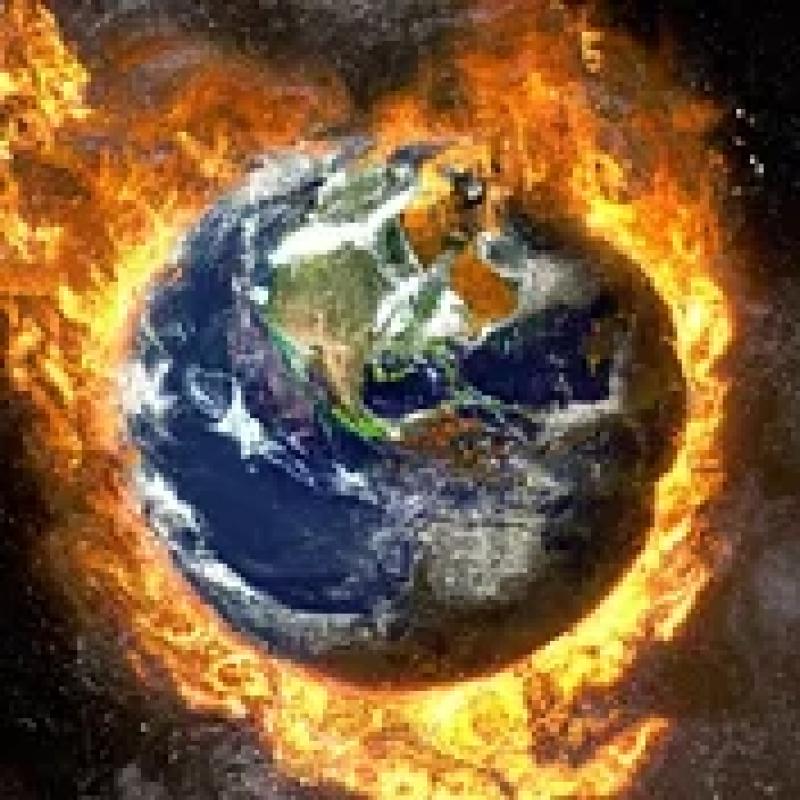Climate skeptics have new favorite graph; it shows the opposite of what they claim


It actually makes the case that CO₂ is the dominant control on Earth's temperature

Joe Rogan and Mel Gibson.
Yeah....
There are links in the seed.

Last September the Washington Post published an article about a new paper in Science by Emily Judd and colleagues. The WaPo article was detailed and nuanced, but led with the figure below, adapted from the paper:
The internet, being less prone to detail and nuance, ran with the figure, with climate skeptics calling it their "new favorite graph" and reposting it everywhere, claiming that it shows the insignificance of recent human warming relative to the Earth's long temperature history.
The furor over the graph reached its apogee in January when Joe Rogan showed it in a podcast interview with Mel Gibson, saying that "If you believe these silly people, way before human beings had ever existed, there's always this rise and fall. And this idea that the whole thing is based on carbon emissions from human beings is total bullshit. It's not true. Right. We might be having an effect, but we're having a small effect, a very small effect."
The actual paper says otherwise
So we decided we'd do the barest amount of actual diligence on the claim. We read the actual paper (non-paywalled version here ). And, lo and behold, we found that rather than dismissing the role of CO2 on longer-term changes in the Earth's climate, it makes one of the strongest claims yet that " CO2 is the dominant driver of Phanerozoic climate [the past 485 million years], emphasizing the importance of this greenhouse gas in shaping Earth history." The authors even express surprise that CO2 explains so much of the apparent temperature variation, and that solar variability does not have as dominant an effect.
It turns out that the Washington Post's graphic only shows half the picture. Here is Figure 4 of the Judd et al 2024 paper, showing both temperature (the plot the WaPo recreated) and CO2 over the past 485 million years. For most of the record the two changed in lock-step, with hotter periods almost invariably having higher CO2 concentrations and cooler periods having lower CO2 concentrations (note that CO2 serves as both a forcing - e.g. during periods of excess volcanism - and a feedback to other external forcings during the Earth's past).
Figure 4a from Judd et al 2024
We also thought to ask the actual authors of the paper what they thought about how their work was being (mis)used in various corners of the internet.
Lead author Dr. Emily Judd replied (emphasis hers):
I've seen quite a bit of misinformation crop up surrounding our paper - particularly the claim that we (humans) have nothing to worry about, with respect to climate change, since the Earth has been warmer for much of the last half-billion years. I cannot stress enough how reductive and problematic this viewpoint is. The flaw in this logic boils down to two key points:
(1) the resilience of the planet does not directly translate our own species' ability to adapt and thrive in the face of human-caused climate change , and
(2) the impact of anthropogenic climate change is (and will continue to be) determined by the rate of change (meaning how quickly CO2 and temperature change) much more than the absolute temperatures, themselves. …When we compare CO2 and temperature across the last half-billion years, we find a strong correlation between the two parameters, which indicates that CO2 has exerted a strong influence on global temperature not just today and in the recent past, but across the last 485 million years of Earth's history.
Similarly, author Dr. Jessica Tierney told us:
Joe [Rogan] seems to be saying that because - geologically speaking - we are in a colder climate that we don't have to worry about human-caused global warming. Nothing could be further from the truth. It certainly has been warmer that today in the deep geological past, but those past warm periods developed slowly over millions of years. As a consequence, life on Earth had time to adapt. The problem with current global warming is the speed. The warming that humans are causing is unbelievably fast, and so humans and the other forms of life that we share the planet with can't fully adapt. In fact, rapid warmings in the geological past are often associated with mass extinctions - abrupt climate change is hard for life to tolerate. So that underlies the danger in allowing our climate to warm so fast right now.
What our study actually shows is that CO2 is the dominant control on Earth's temperatures across geological timescales. Every time CO2 is high, temperatures are warm. So it follows naturally that, as humans emit more CO2, the climate warms. The study reinforces the strong connection between CO2 and climate change.
It's not just how hot, but how fast
While Earth has experienced warmer periods in its deep past, the seriousness of climate change is defined by its pace. The warm temperatures in Earth's past unfolded over millions of years, giving life ample time to evolve. In contrast, today's changes are happening at an unprecedented rate—within decades rather than millennia—leaving inadequate time for adaptation.
The geological record offers sobering evidence of what happens when climate change occurs too rapidly: mass extinctions.
Figure 2 in Judd et al 2024
The above figure plots surface temperature (black) for the past 485 million years along with mass extinction events (orange vertical lines). The timing of two events are coincident with rapid climate fluctuations:
-
The Late Ordovician mass extinction (440 million years ago) saw approximately 60% of marine species vanish.
-
The Permian-Triassic extinction (251 million years ago), often called "The Great Dying," eliminated 90% of all species during a period of dramatic climate change linked to volcanic CO₂ emissions.
This record demonstrates that climate change can have extreme consequences. Organisms don't have time to adapt and risk extinction.
As Dr. Judd told us:
The geologic record has taught us that when CO2 and temperatures change slowly, organisms can keep pace with the environmental change - evolving, developing adaptations and/or migrating to new places. However, when CO2 and temperatures change rapidly, as is happening today due to anthropogenic emissions, evolution can't keep pace with the environmental change. We've seen this before at the end of the Permian, due to widespread volcanism, and at the end of the Cretaceous, due to an asteroid impact - when the climate and the environment change rapidly, evolution simply can't keep up. What is happening today is particularly catastrophic because the organisms that exist evolved to tolerate the icy conditions of our modern planet - just like humans, they're cold adapted. They (and we) are not equipped handle the warmer conditions and the rate of change is too fast for evolution to keep pace. Not only have humans evolved to tolerate colder conditions, we have also established our populations close to water sources and often near sea level. As we observe the Earth warming at a rapid pace within human time scales, we are faced with challenges such as more intense storms, more frequent and intense droughts (in some regions) and floods (in some regions), rising sea levels, and, ultimately, a reduction in habitable and arable land.
Carbon dioxide controls the climate
Another key insight from this record is the consistent relationship between atmospheric carbon dioxide levels and global temperatures across the geologic record. Throughout Earth's history, this correlation is remarkably clear: when CO₂ concentrations rise, temperatures follow.
Figure 4b from Judd et al., (2024)
Humans have increased atmospheric CO₂ by approximately 50% in just 150 years—a mere instant on the geologic timeline. Predictably, temperatures have responded, with 2024 measuring 1.55°C warmer than pre-industrial levels.
So yes, Earth has been hotter, but the pace of climate change is more important than absolute temperature. Organisms today (humans included) have evolved in colder temperatures, and the geologic record shows us that rapid warming could devastate our cold-adapted ecosystems.
Note: This article is a collaboration between Zeke Hausfather and Devin Rand, a research scientist at Berkeley Earth.
Whatever










My problem with Rogen and Gibson is that I don't know if they're too stupid/uneducated to be able to understand... or if they're willfully not understanding.
Kinda like our Usual Suspects...
I'd say a little (or a lot) of both.
For most of the record the two changed in lock-step, with hotter periods almost invariably having higher CO2 concentrations and cooler periods having lower CO2 concentrations
That still doesn't prove that CO2 is the driver, all it could mean that CO2 levels fall and with the warming and cooling caused by sea level rises and falls.
When you look at the NASA findings from the ice cores from Antarctica as the sea levels rise so does the temperature and CO2 levels and as the ice sheets form the CO2 levels drop and temperatures also drop.
CO2 levels fall and
Should've been "CO2 levels rise and fall".
The Permian-Triassic extinction (251 million years ago), often called "The Great Dying," eliminated 90% of all species during a period of dramatic climate change linked to volcanic CO₂ emissions
Are they even sure about that. If you note, they included extent of ice sheets in that graph (figure 2). The great die off happened as the ice sheets receded rather quickly not because of CO2 but because of the volcanic activity dumping ash on the ice sheets causing them to recede faster increasing the sea levels and the temperatures and all that extra ash poisoned everything on land and in the seas. It seems that climatologists, like Dr. Judd, need to blame all they can on CO2 without thinking of any other possibilities.
The climate change skepticism questionnaire: Validation of a measure to assess doubts regarding climate change - ScienceDirect
From the article....
"On the individual level, a primary reason why climate change knowledge does not translate into sustainable behavior change is climate change uncertainty and skepticism about the causes, seriousness, and effectiveness of actions to mitigate global warming among the public ( Gifford, 2011 ; Lorenzoni et al., 2007 )"
The left's hysterical fear mongering about this so called "emergency" has not had the desired effect of educating the masses. Just the opposite, it has turned them off